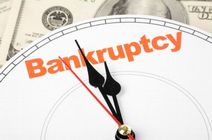- You are here:
- Home »
- Bankruptcy »
- Bankruptcy-related M&A has “only just begun”
Bankruptcy-related M&A has “only just begun”

Bankruptcy-related mergers and acquisitions have hit their highest level globally since August 2004, and are set to keep rising as more companies are forced into distressed sales, according to Thomson Reuters data and restructuring practitioners. It is one reason for the increase in bankruptcy-related work for contract attorneys in both the U.S. and Europe. Thomson Reuters identified 34 announced deals in March alone, and 67 so far this year, where the target company was in bankruptcy or administration proceedings. The vast majority were in the US or Japan – reflecting the earlier onset of the recession in the US and more liberal bankruptcy rules in both countries, which allow companies to continue operating while they reorganize.
Among the highest-profile deals were those of Delphi, the US car parts maker that recently sold its brakes and suspension business to a Chinese buyer, and BearingPoint, the US technology consultancy that sold its government operations to Deloitte.
Practitioners around the world forecast that the number of transactions involving distressed companies must rise further.
“We’ve only just begun,” said Gregory Milmoe, a US restructuring partner at Skadden Arps. “Given the dearth of capital and the substantial increase in the number of companies that will be troubled, one would expect the M&A rate to increase dramatically.”
Richard Stables, global co-head of restructuring at Lazard, said: “People cannot borrow as much as they once could, so you’ve got to figure out how to fill the gap . . . That’s why you may think about selling part or even all of the business.”
Monthly totals for bankruptcy M&A peaked at 87 in July 2002 and slumped to seven in May 2007, just before the credit crunch hit. In the last downturn, a flurry of telecoms and technology company failures led to asset sales to strategic buyers as well as private equity buyers.
This time, industrial and retail companies have been the most prominent distressed sellers but private equity buyers have been few because debt has become far more expensive. Insolvencies traditionally peak a year to 18 months after the start of a recession, so more bankruptcy-related sales are forecast to emerge later this year, practitioners said.
Sources: Financial Times, Thomson Reuters, Skadden, Arps, Slate, Meagher & Flom LLP
